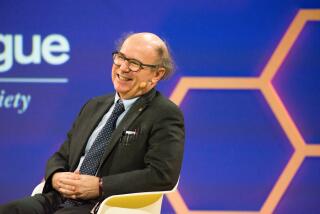BOOK REVIEW : Differing Views of Cosmic Debate
- Share via
Cosmos and Metacosmos by Robert Wesson (Open Court: $26.95 hardcover, $11.95 paper; 157 pages)
Some people--those of the scientific turn of mind--look at the order and complexity of the world around us and say it’s all an accident, a matter of chance. Other people--those of the religious turn of mind--look at the same facts and conclude that a Creator must be responsible for all this.
Both of these views are matters of faith--they can’t be proved.
Robert Wesson, a political scientist with a keen interest in matters philosophical, believes there is a third approach, which he calls “nontheistic nonmaterialism”: “This lies midway between . . . the belief that the world is the work of a great personality who watches over it and perhaps intervenes on occasion to set things right, and the theory that material particles are the totality of existence.”
In Wesson’s view, there is a metacosmos, a ground of being, if you will, that underlies the material world and makes it possible. “The material world is not the totality of existence but a derivative of something primordial,” he says. It’s not God, but purpose.
Now, regular readers of this space have perhaps noticed that on this most basic of all issues, I side with the reductionists. It is as clear to me as the nose on your face that biology is a branch of chemistry, that chemistry is a branch of physics and that the impersonal, uncaring, undirected laws of science can ultimately explain the universe and everything in it.
Nonetheless, although I disagree with its premise, Wesson’s book was a delight to read. In 139 well-written, well-argued pages, he displays mastery of and deep thought about a stunning range of subjects--physics, biology, civilization, progress, mind and ethics among them.
In each case, he claims the reductionist model doesn’t work.
“Reductionism, however attractive as theoretical simplification, is to a large extent only theoretical and programmatic, giving an illusion of deeper understanding than we have,” Wesson writes.
For example, he challenges Darwinian evolution as a plausible account of how living creatures evolved from single-celled organisms to us. Not that he thinks Darwin is wrong, mind you. Rather, he asserts, Darwin is incomplete. There must be something else at work in addition to natural selection to account for the development of organs and other complex structures, including instincts.
Evolution can explain small changes, but not large ones, Wesson asserts. “If mutations are like typos, it is easier to imagine them producing new words than new chapters. Natural selection is certainly a proofreader of the book of life, perhaps an editor; to give it credit for full authorship is too much.”
Rather, he says, “It is reasonable to guess that the patterns of life, while conforming to physical and chemical laws, go beyond them in the realization of the order-making capabilities behind and in the universe, incorporating what we can fairly call a higher, or more creative level of being.”
Similarly, he finds no explanation of why evolution alone created minds that like to play chess or that like to think about consciousness or philosophy. Where is the survival value in reading book reviews? Or is that just an extra that got thrown in along the way?
The trouble is that it’s difficult to distinguish what Wesson calls “purpose” from what theologians call “God.” Wesson says they are not the same--”nontheistic nonmaterialism”--but it’s not clear what’s different other than a different name.
Wesson’s “third way” is no more provable or unprovable than theism or atheism or any other world view. Those who are convinced will say it makes sense; those who are unconvinced will stay unconvinced. But it makes you wonder.
More to Read
Sign up for our Book Club newsletter
Get the latest news, events and more from the Los Angeles Times Book Club, and help us get L.A. reading and talking.
You may occasionally receive promotional content from the Los Angeles Times.






